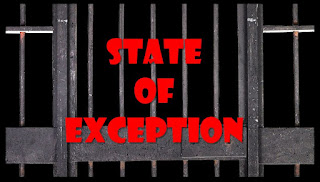State of Exception continues in 2023
As El Salvador enters 2023, the exceptional is the new normal. El Salvador has lived under an emergency State of Exception, adopted by its Legislative Assembly at the behest of president Nayib Bukele, since March 28, 2022. That day came in the midst of a bloody weekend in which gangs murdered at least 87 people around the country. Under the State of Exception, security forces of the police and military can arrest anyone without a warrant or observing them commit a crime, can hold them for 15 days before appearing before a judge and without telling them the charges, and can freely intercept communications without a judicial order. Those detained receive initial hearings, before judges with their identities masked, in groups that often number in the hundreds where the charges are simply gang affiliation. Judges routinely order defendants into El Salvador's hellishly overcrowded prisons without bail, to await for their next hearing which could come in six months.
In an interview during the first week of January El Salvador's Minister of Security, Gustavo Villaltoro, provided statistics on the number of people seized under the "war on gangs" of the current emergency regime:The Minister said that during the emergency regime, 61,300 people have been captured until January 3, 2023, but that more still need to be arrested. Also, he explained that 700 people linked to the gangs have been captured during the military siege established in Soyapango, since last December 3.Villatoro also said that, to date, 3,313 persons detained had been set free for lack of proof of their connections to the gangs. Of those, only 450 were released by actions of prosecutors, and a thirdere minors freed by judges who handle juvenile crimes. (3313 would be 5.4% of those 61,300 arrested, but there is no reason to assume that there is proof for all of the remaining 96%).
Villatoro said he plans to ask the Legislative Assembly to extend the State of Exception for a tenth time in the coming week.
The newspaper also visited three communities in the San Salvador metropolitan area which have been historically controlled by MS-13. Everything suggests that MS-13 is on its last legs. But, according to these sources, members of the police and the army have filled this vacuum and are reportedly now the ones committing crimes.Although this situation may not hold true for all communities in El Salvador, the crackdown has hurt MS-13′s influence in three key areas: extortion, territorial control and recruitment of new members. [entire article here]
In a report titled We Can Arrest Anyone We Want, the human rights groups Cristosal and Human Rights Watch documented their findings of violations of human rights through the end of November 2022. Their findings, based on more than 1100 interviews with affected persons, their families, and participants in the system included the following:
The authorities’ campaign of mass, indiscriminate arrests has led to the detention of hundreds of people with no apparent connections to gangs’ abusive activity. In many cases, detentions appear to be based on the appearance and social background of the detainees, or on questionable evidence, such as anonymous calls and uncorroborated allegations on social media. In these cases, police and soldiers did not show people a search or arrest warrant, and rarely informed them or their families of the reasons for their arrest. A mother who witnessed the detention of her son said that police officers told her, “We can arrest anyone we want.”In some cases of people detained by security forces, officers refused to provide information about the detainees’ whereabouts, in what amount to enforced disappearances under international law. Authorities left such victims defenseless and caused their family members inhumane and abusive uncertainty and suffering....This mass incarceration has aggravated historically poor conditions in detention, including extreme overcrowding, violence, and poor access to goods and services essential to rights, such as food, drinking water, and health care. Some of the few people who were released from detention reported inhumane conditions and, in some cases, torture and other forms of ill-treatment.According to Salvadoran authorities, 90 people have died in custody during the state of emergency. Authorities have failed to meaningfully investigate these deaths. In some cases, detainees who died in prison did not receive access to the medication they needed, family members said.
By the late summer, Jeremias is usually out in the fields alongside Roxana's two boys and his two nephews, planting corn for the family to eat. With them in prison, he had to forgo the crop this year, because it's too much to handle alone.The state of exception "has a human cost that we still can't fully see," said Noah Bullock, Executive Director of Cristosal. "There is the torture, the inhumane treatment, the more than eighty deaths in prisons, and that's only talking about the people who are detained. Life projects that people have built slowly over generations are suddenly paralyzed and collapsed. There's the loss of income and the simultaneous expenses. The social cost of being stigmatized as 'terrorists.'"The administration seems unperturbed by the volume of blameless people it has locked up. "There will always be victims in war," Vice President Felix Ulloa has said of the state of exception. [entire article here].


Comments